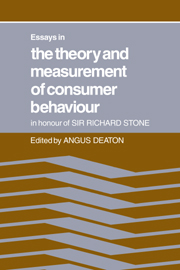Book contents
- Frontmatter
- Contents
- Foreword
- List of contributors
- Part one The analysis of commodity demands
- Part two The theory of index numbers
- Part three The consumption function and durable goods
- Introduction
- 8 Testing neoclassical models of the demand for consumer durables
- 9 Liquidity and inflation effects on consumers' expenditure
- Part four Other aspects: fertility and labour supply
- Bibliography of Sir Richard Stone's works 1936–79
- Index of names
- Subject index
- Frontmatter
- Contents
- Foreword
- List of contributors
- Part one The analysis of commodity demands
- Part two The theory of index numbers
- Part three The consumption function and durable goods
- Introduction
- 8 Testing neoclassical models of the demand for consumer durables
- 9 Liquidity and inflation effects on consumers' expenditure
- Part four Other aspects: fertility and labour supply
- Bibliography of Sir Richard Stone's works 1936–79
- Index of names
- Subject index
Summary
One of the most difficult areas in consumer theory is that which concerns itself with intertemporal choice. Theory which ignores uncertainty lacks credibility while theory taking it into account is complex and hard to implement. On the empirical side, the analysis of the consumption function and of durable goods presents all the classic time-series problems of dynamics, seasonally and serial correlation. Even after 40 years of continual econometric activity, and in spite of their contemporary treatment as standard classroom examples of applied econometric analysis, both durable goods and consumption functions are still subject to lively controversy.
Much the most influential work on what is still called the ‘modern’ theory of the consumption function is that of Modigliani and Brumberg (1955a, b) on the life-cycle model, although the ideas go back to Fisher and Ramsey. The life-cycle model has the inestimable advantage of viewing the theory of the consumption function as a part of consumption theory in general. This work, together with that of Friedman (1957), provided the basic model of the consumption function which has dominated theoretical and empirical discussion ever since. In its applied form at least, the basic regression is one of consumption on its own lagged value and on income although a number of other variables (lagged income, wealth, liquid assets, the distribution of income) make periodic appearances.
- Type
- Chapter
- Information
- Essays in the Theory and Measurement of Consumer Behaviour: In Honour of Sir Richard Stone , pp. 210 - 212Publisher: Cambridge University PressPrint publication year: 1981



